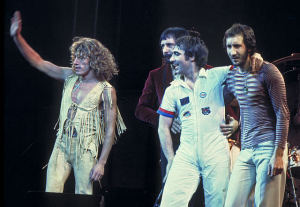JAG Classics: Quadrophenia by The Who
With so much new music available today, sometimes it’s good to look to the past. Welcome the JAG Classics where we examine the albums of yesteryear. Today we look at Quadrophenia by The Who.

The Who were bonafide rock stars by the time they released Quadrophenia in 1973. 1969’s Tommy was the first great rock opera, spurning traditional three minute rock singles for more expansive songs while telling the story of a quasi-Messianic deaf, dumb and blind boy. The album was hailed as a breakthrough for the band, producing “Pinball Wizard” and memorable festival performances at Woodstock and the Isle of Wright Festival. The band followed up Tommy‘s success with the more traditional rock album Who’s Next before taking time off to write a new album.
Following Tommy, guitarist/songwriter Pete Townshend tried to write a follow up rock opera (tentatively called Lifehouse), but instead couldn’t find his vision and suffered a nervous breakdown. After Who’s Next, Townshend got around to writing his second rock opera, Quadrophenia, and the results where spectacular. The project tells the story of a mentally ill boy trying to come to grips with himself and the world around him.
Apparent from the start, and reflecting the Townshend’s mind frame, Quadrophenia is a more urgent and cynical story. “The Real Me” introduces listeners to Jimmy, who is dealing with his multiple personalities (four of them, reflecting each member of the band). Tommy‘s music was light (even if the lyrics weren’t) whereas “The Real Me” is a driving song, with thrashing power chords, wild drums and a continuous bass line all coming to a head on the song’s instrumental bridge. It’s a lot to digest, but Jimmy’s life is complex and not a pleasant one. No help from family, friends or professionals instantly creates the despair felt throughout the album.
Jimmy’s home life sucks (“Cut My Hair”) as does the realization of his musical idols (“The Punk And The Godfather” and conveniently, The Who filling the role of his idols). We’ve all had terrible jobs, Jimmy realizes his in “The Dirty Jobs.” There are no lofty ideals in Quadrophenia, just desperation. Disillusioned with every thing in his life, Jimmy does what anyone would. He takes a lot of drugs and hops on a train (“5:15”) to take him to the coast, the one place he remembers as a sanctuary. Lyrically “5:15” deals with Jimmy’s memories, but instrumentally you can hear the world revolving around him. It’s the noise of the train itself, passengers’ everyday lives happening all around him.
Predictably, the coast isn’t what he remembers it to be. Jimmy thinks about killing himself in “Drowned,” a fantastic song where everything Jimmy believes about his life, the desperation, disillusionment and nihilism comes to a head, with the lyric “I want to drown, in cold water” exemplifying where we’ve come. In a last ditch effort to save himself, Jimmy tracks down one of the peers he looked up to, only to find that he too has grown into a more adult life (“Bell Boy”), failing to achieve anything great.
Jimmy finally breaks, taking a boat into the sea only to be stranded on a rock (aptly titled “The Rock”) before coming to a mental and spiritual realization in the album’s closing track, “Love Reign O’er Me.” Jimmy, finally at his lowest point, has given up everything. At the end, it’s a realization that everyone has to grow up and mature to get through life.
So the album is about growing up, discovering yourself and finding that nothing in life is perfect or goes according to plan. As much as Quadrophenia is an original story, Jimmy very literally is The Who and you only have look how the band’s career arch played out after this album. You can hear the tension everywhere. Self referential, the band, very much disillusioned with each other, committed it to tape. Not many of us are rock stars, and even fewer can relate to the religious awakening of Tommy, but everyone faces the struggles that Jimmy (and by extension The Who) experienced in Quadrophenia. Acceptance is never guaranteed and relationships with family and friends are not always easy. That’s why it stands up so well, why we can relate to it and why it’s The Who’s best work. The band never matched the heights it scaled as a younger group, just like many of us will never see being young as anything but special. Quadrophenia‘s message is that it’s OK, as long as you can pick yourself up and move on.

Leave a Reply